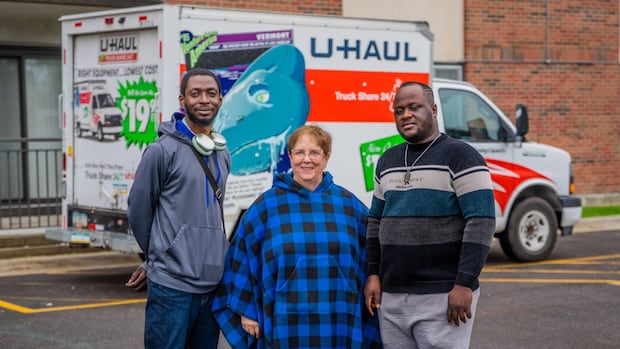With just days to go before the federal government stops funding hotel stays for asylum seekers, some Ottawa residents and community organizations are rolling up their sleeves to help their neighbours find stable housing.
“When deadlines are approaching and you do not have anywhere to go, it’s really … scary,” said Rev. Daniel Addai Fobi, an asylum seeker from Ghana who leads a ministry for 2SLGBTQ+ refugees and newcomers at Kitchissippi United Church.
“They are feeling very, very afraid.”
Immigration, Refugees and Citizenship Canada (IRCC) has said funding for hotel rooms will end Sept. 30. IRCC said it was housing 136 asylum claimants in one Ottawa hotel as of mid-September.
Fobi and other volunteers have been helping a group of 20 asylum seekers who’ve joined the church community and are being forced out of IRCC-funded rooms find stable accommodation in the past few weeks.
“They fear [being] taken to other parts of Canada,” Fobi said. “They say it’s giving them sleepless nights, and I spoke to the children and they asked me, are they going to be on the street?”
For months, IRCC has said it would help those still in hotels find longer-term housing before the program ends Tuesday.
But advocates said there haven’t been enough local solutions for families in Ottawa, where city shelters are over capacity and government officials have been encouraging claimants to relocate to other regions including the Maritimes.
That’s why residents like Denise Bonomo are taking matters into their own hands. She drove a U-Haul truck full of furniture to an Ottawa apartment last week to help one asylum seeker settle into her new home.
“Our hearts really ache for the people who are going through this,” said Bonomo, chair of council with the Kitchissippi church.
Bonomo said volunteers have been driving around the city with claimants, negotiating with landlords and acting as references, all with the goal of helping families find rental accommodation within their price range.

It’s been a challenge.
While they have managed to secure stable housing for a handful of families, Bonomo said the group is currently looking for a home for one single mom and her five children.
“Landlords don’t want to take a risk on people who have new jobs … who don’t have references from Canada, who don’t have credit histories in Canada,” she explained. “It really does leave our group of folks very vulnerable.”
Asked why her church is doing this, Bonomo replied: “That’s what we’re supposed to do. We’re to welcome, be hospitable, be courageous in taking on social injustices.”

In Kanata, a local non-profit has been pitching in to help claimants furnish their new spaces.
“As they’ve secured housing … this gives them the opportunity to actually make that house a home,” said Kailee Brennan, executive director of Matthew House.
The furniture bank has served over 1,800 families last year, she said, and is looking to expand in the new year. The organization also provides temporary housing for single asylum seekers.
“Families should not be left in limbo while government sorts out responsibilities,” Brennan said. “That uncertainty is deeply unfair.”
Everybody in our community belongs.– Kailee Brennan, Matthew House
Brennan said the federal government needs to co-ordinate longer-term solutions with other levels of government and community organizations, and invest in sustainable housing to better serve vulnerable populations.
“So I’m not surprised that community groups have stepped up to this challenge,” Brennan said. “I admire the work that they continue to do, driven by their values that everybody in our community belongs.”

Other residents, organizations stepping up
In a statement to CBC News on Friday, IRCC said it’s sticking to its Sept. 30 deadline, and added it’s “working with partners to ensure claimants are getting all the necessary help to secure a housing solution and continues to monitor the situation.”
Meanwhile, other residents and organizations told CBC News they’re opening up their homes or helping families secure housing as they’re forced to vacate hotels.
But advocates say at the 11th hour, there are still families without a safe place to go.
“Kitchissippi [United Church] alone is not enough,” said Fobi. “We are making a compassionate appeal to the IRCC and all forms of government, non-governmental organizations, foundations and the good people of Ottawa … come to our help.”







